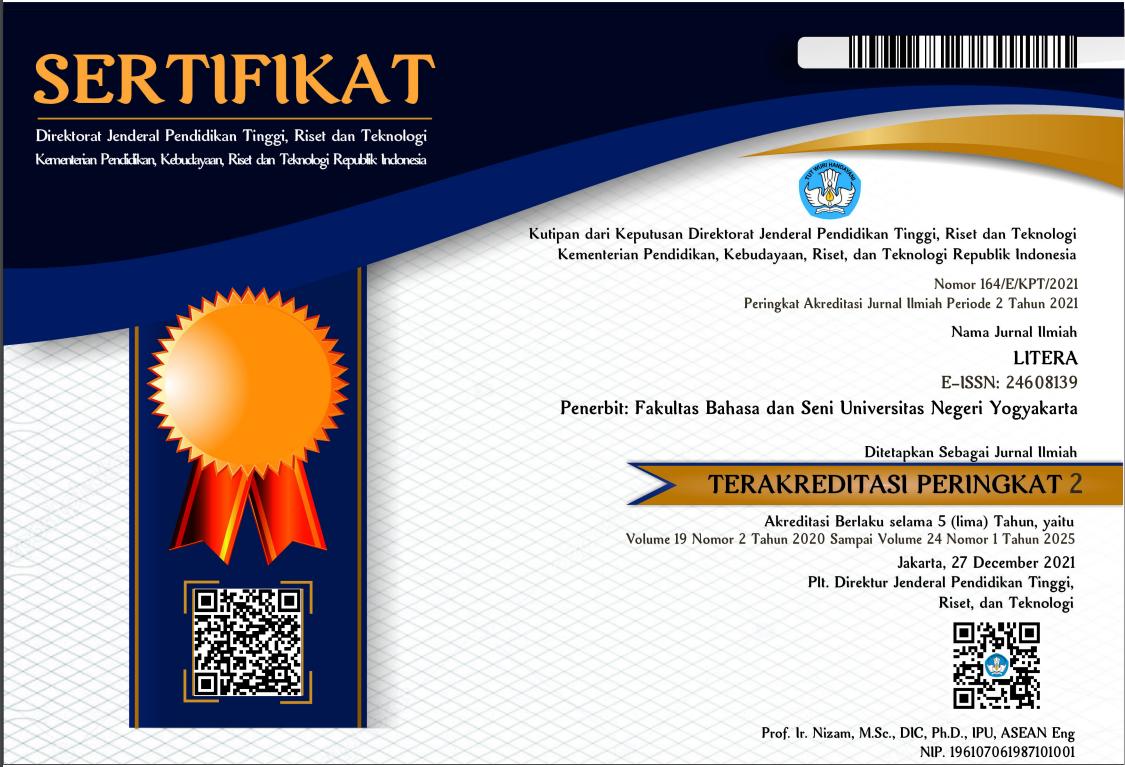NILAI-NILAI KARAKTER DALAM TINDAK TUTUR ILOKUSI DALAM BUKU WIR BESUCHEN EINE MOSCHEE
Abstract
DALAM BUKU WIR BESUCHEN EINE MOSCHEE
Tri Kartika Handayani, Sri Megawati dan Lia Malia
FBS Universitas Negeri Yogyakarta
email: tri_kartika@uny.ac.id
Abstrak
Penelitian ini bertujuan mendeskripsikan: (1) jenis dan bentuk tuturan. (2) fungsi
tuturan, dan (3) nilai-nilai karakter yang terdapat dalam tuturan ilokusi dalam buku
Wirbesucheneine Moschee (WBM) ‘Kami Mengunjungi Mesjid’. Data penelitian ini yaitu
semua tuturan yang terdapat dalam WBM. Buku ini adalah salah satu buku bacaan siswa
kelas 5 Sekolah Dasar di Jerman. Penelitian ini penelitian deskriptif kualitatif. Penyediaan
data menggunakan metode simak bebas libat cakap (SBLC) dan data dianalisis dengan
menggunakan metode agih dan padan pragmatis. Dari hasil analisis ditemukan empat
jenis tuturan, yaitu asertif, direktif, komisif dan ekspresif. Tiap jenis tuturan memiliki
bentuk yang berbeda, yaitu tindak tutur langsung literal, tidak langsung literal, langsung
tidak literal, dan tidak langsung tidak literal. Fungsi tuturan dalam buku WBM yaitu
tuturan asertif, direktif, komisif dan ekspresif. Nilai-nilai karakter dalam buku WBM
ada sepuluh, yaitu religius, toleransi, disiplin, kerja keras, kreatif, demokratis, rasa ingin
tahu, menghargai prestasi, bersahabat/komunikatif, dan peduli sosial.
Kata kunci: nilai karakter, tuturan ilokusi, buku Wir besuchen eine Moschee
MORAL VALUES IN THE ILLOCUTIONARY SPEECH ACT
IN CHILDREN’S BOOK WIR BESUCHEN EINE MOSCHEE
Abstract
This study aims to describe: (1) typesand forms of utterances, (2) functions of utterances,
and (3) moral values in the illocutionary act in the children’s book Wir besuchen eine Moschee
(WBM) ‘We Visit the Mosque’. The data are all utterances in WBM. The book is one of the
textbooks for Grade V students of elementary schools in Germany. This was a qualitative
descriptive study. The data were collected by the uninvolved conversation observation
technique and analyzed by using the distribution and pragmatic correspondence methods.
From the results of the analysis, four types of utterances are found: assertive, directive,
commissive, and expressive. Each type of utterance has a different form, namely literal
direct, literal indirect, non-literal direct, and non-literal indirect speech acts. The functions
of utterances in WBM are assertive, directive, commissive, and expressive. There are ten
moral values in WBM, namely religiosity, tolerance, discipline, hard work, creativity,
democracy, curiosity, appreciation of achievement, friendship/communication, and social
care.
Keywords: moral values, illocutionary act, children’s book Wir besuchen eine Moschee
Full Text:
PDFDOI: https://doi.org/10.21831/ltr.v15i2.11831
Refbacks
- There are currently no refbacks.
______________________
__________________________________________________________________________________________________
Litera Journal is published by the Faculty of Languages, Arts, and Culture Universitas Negeri Yogyakarta in collaboration with Himpunan Sarjana Kesusasteraan Indonesia (HISKI)
The International Journal of Linguistic, Literature, and Its Teaching at http://http://journal.uny.ac.id/index.php/litera/ is licensed under a Creative Commons Attribution-ShareAlike 4.0 International License
__________________________________________________________________________________________________















